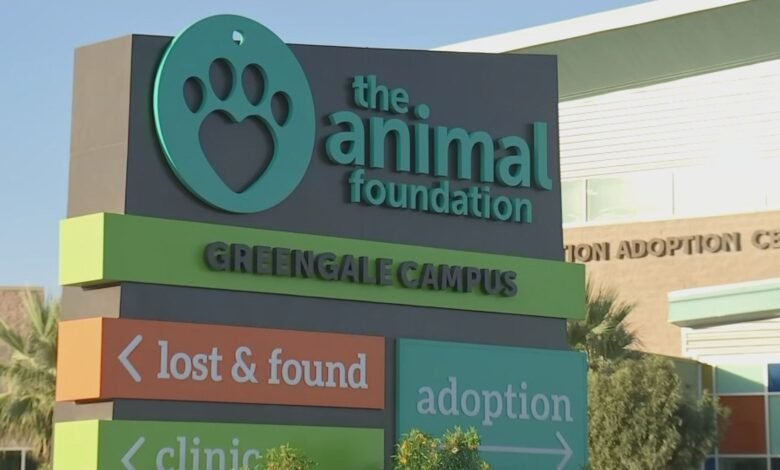We may earn a commission when you click on links across our website. This does not influence our opinions — learn more.
523 Dogs Struggle for Space as Las Vegas Shelter Hits Capacity Again

Las Vegas’s largest animal shelter is once again sounding the alarm.
The Animal Foundation, which cares for hundreds of homeless pets daily, has reached a critical tipping point — 523 dogs now crowd the facility, with dozens more arriving every day.
The situation has become so dire that without immediate community action, staff warn that euthanizing healthy, adoptable dogs could become an unavoidable reality.
On October 15, 2025, The Animal Foundation took to social media to issue an urgent call for help. Just overnight, 28 dogs arrived at the shelter — and that number kept climbing throughout the day.
The sudden influx pushed the facility well beyond its stated capacity of 454 dogs for the second time in a little over a month.
Even with 51 pets adopted on Wednesday — traditionally one of the quieter adoption days — CEO Hilarie Grey said the shelter simply couldn’t keep pace with the sheer number of new arrivals.
“The math doesn’t add up,” she admitted, describing exhausted staff working around the clock in overcrowded conditions that grow more chaotic by the hour.
When the shelter exceeds its capacity, the reality is grim. Dogs that would normally rest in clean, comfortable kennels are forced into crates lining hallways and storage rooms.
The noise is constant, stress levels soar, and behavioral decline sets in fast.
“Once-healthy dogs begin to deteriorate in this environment,” Grey explained. “They start showing stress-related behaviors that can make them harder to place, and their quality of life declines.”
In such cases, shelter officials face the painful question of whether keeping an animal confined under these conditions is humane — and that’s when euthanasia becomes part of the conversation.
The shelter’s struggle isn’t new, but this year has been different. Traditionally, intake numbers drop during fall and winter. Not this year.
Since 2020, The Animal Foundation has seen a 61% increase in animals coming through its doors. Each day, staff process 100 to 150 new arrivals, most of them strays.
The campus now cares for between 800 and 900 animals daily, leaving little room — and even less time — for staff to provide the kind of attention each pet deserves.
It’s an unrelenting cycle that shows no signs of slowing.
How the Public Can Help
Despite the bleak outlook, there’s still hope.
Grey and her team insist that the crisis can be reversed if the community acts now. Whether through adoption, fostering, donations, or volunteering, every contribution counts.
The most immediate way to help is to adopt — particularly medium and large dogs, which spend the longest time in the shelter.
The Animal Foundation operates Tuesday through Sunday, 11 a.m. to 7 p.m., at 655 N. Mojave Road.
Standard adoption fees are $25, but military veterans and seniors aged 65 and over can adopt for free. Visitors can browse adoptable pets online before arriving at animalfoundation.com.
The shelter has simplified its adoption process, removing traditional barriers such as landlord checks or HOA verification. “We want to make adoption accessible to everyone,” Grey said.
Those looking to make the biggest impact can view the shelter’s “at-risk animals” list — dogs and cats in immediate danger due to space constraints.
Fostering provides vital relief for overcrowded shelters. The Animal Foundation is most in need of temporary homes for medium and large dogs over six months old and weighing 35 pounds or more.
Foster periods range from a few weeks to a few months, and all supplies — food, medicine, and training support — are provided. Walk-in fostering begins daily at 8 a.m. in the adoption lobby.
Incentive programs occasionally offer $200 to foster families who take in eligible dogs for 30 days, a reflection of how urgently these temporary homes are needed.
To start fostering, visit the shelter in person or email foster@animalfoundation.com.
Those unable to adopt or foster can still make a tangible difference. The shelter constantly needs food, treats, linens, toys, and cleaning supplies to care for the hundreds of animals onsite.
Most-needed items include:
- Dog and cat treats (Pup-Peroni is a favorite)
- Dry and canned pet food
- Blankets, towels, and bath mats
- Kong toys and peanut butter
- Martingale collars and puppy pads
Donations can be dropped off at 655 N. Mojave Road or purchased directly from the shelter’s Amazon Wish List at animalfoundation.com/wish-list.
From walking dogs to socializing cats, volunteers are the heartbeat of the shelter’s operations. The need has never been greater.
Available roles include animal enrichment, dog walking, administrative help, and event support. Applications can be submitted through animalfoundation.com/volunteer.
Many shelter intakes are preventable. Only 23% of incoming animals have microchips, leaving thousands unclaimed. Pet owners are urged to keep collars, tags, and chips updated.
If you find a stray pet, try to reunite them with their owner before bringing them in — a small act that can make an enormous difference.
Clark County now mandates microchipping for all dogs, part of a broader effort to keep pets out of shelters and back with their families.
The Animal Foundation isn’t just Las Vegas’s largest shelter — it’s one of the busiest in the nation.
In 2024 alone, it saved more than 20,000 animals, reunited nearly 4,000 pets with their owners, and spayed or neutered 11,000 more.
Yet those achievements are being overshadowed by the current crisis. As Grey emphasized, the shelter’s capacity is finite — but compassion, she said, is not.
“It is heartbreaking to even be thinking along those lines,” she said. “To a person, everyone is dedicated to finding a pathway for every animal.”
Every dog in the shelter deserves a home, and time is running out. Whether you adopt, foster, donate, or volunteer, your action could mean the difference between life and death for a dog in need.

